Related Research Articles

John Marty Stuart is an American country and bluegrass music singer, songwriter, and musician. Active since 1968, Stuart initially toured with Lester Flatt, and then in Johnny Cash's road band before beginning work as a solo artist in the early 1980s. His greatest commercial success came in the first half of the 1990s on MCA Records Nashville. Stuart has recorded over twenty studio albums, and has charted over thirty times on the Billboard Hot Country Songs charts. His highest chart entry is "The Whiskey Ain't Workin'", a duet with Travis Tritt. Stuart has also won five Grammy Awards out of sixteen nominations. He is known for his combination of rockabilly, country rock, and bluegrass music influences, his frequent collaborations and cover songs, and his distinctive stage dress. Stuart is also a member of the Grand Ole Opry and Country Music Hall of Fame.
Delbert McClinton is an American blues rock and electric blues singer-songwriter, guitarist, harmonica player, and pianist.

Russell Glyn Ballard is an English singer, songwriter and musician.
"Murder on Music Row" is a 1999 song written by Larry Cordle and Larry Shell, and originally recorded by American bluegrass group Larry Cordle & Lonesome Standard Time, as the title track from their album Murder on Music Row. It gained fame soon after that when it was recorded as a duet between American country music artists George Strait and Alan Jackson. The song laments the rise of country pop and the accompanying decline of the traditional country music sound; it refers to Music Row, an area in Nashville, Tennessee considered the epicenter of the country music industry.
"Let's Make Love" is a song written by Marv Green, Aimee Mayo, Chris Lindsey and Bill Luther, and recorded by American country music artist Faith Hill and her husband Tim McGraw as a duet. It was released in 2000 as the third single from Hill's album, Breathe, and is also featured on McGraw's first greatest hits album. The song reached number 6 on Hot Country Songs. An accompanying video was released in black and white, and featured McGraw and Hill in and around Paris.

"Sold " is a song written by Richard Fagan and Robb Royer, and recorded by American country music artist John Michael Montgomery. It was released in May 1995 as the second single from his self-titled album. It hit number-one on the country charts in the United States and Canada in July 1995. It is one of Montgomery's best-known songs and was named Billboard Hot Country Singles & Tracks' number-one single for 1995.
"Come On" is a song written by New Orleans rhythm and blues artist Earl King. He first recorded the song as "Darling Honey Angel Child" in 1960 for the Ace Records subsidiary Rex. Later that year, he recorded it as a two-part song for Imperial Records using some new lyrics. Retitled "Come On", it was released in 1960 with "Come On – Part I” as the A-side backed with “Come On – Part II”.
"Good Times" is a song written and recorded by Sam Cooke, released as single in 1964.
"Suspicions" is a country music song. It was originally recorded and released as a single in 1979 by Eddie Rabbitt from his album Loveline; his version was a Number One hit on the Billboard country music charts and a Top 20 hit on the Billboard Hot 100. The song saw renewed popularity in late 2007-early 2008, when Tim McGraw recorded and released a cover version on his album Let It Go.
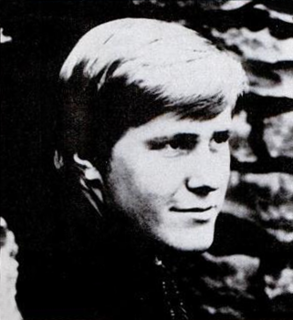
John Wesley Ryles is an American country music artist. Ryles recorded a string of hit country songs, beginning in 1968 when he was still a teenager, and continuing through the 1980s. He no longer records as a headline artist but remains active in the music industry as a session musician.
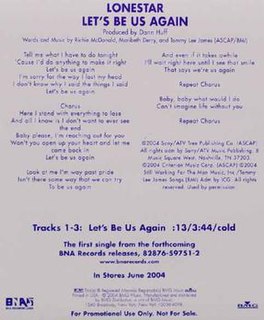
"Let's Be Us Again" is a song recorded by American country music group Lonestar. The song reached the Top 5 on the Billboard Hot Country Singles & Tracks charts. It was released in March 2004 as the first single and title track from their album of the same name. Then-lead singer Richie McDonald co-wrote the song with Maribeth Derry and Tommy Lee James.

"Let It Go" is a song written by Aimee Mayo, Bill Luther and Tom Douglas, and performed by American country music singer Tim McGraw. It was released in July 2008 as the sixth single and title track from his album Let It Go. It was his forty-second Top 40 hit on the Billboard country charts.
"Who's Cheatin' Who" is a country music song written by Jerry Hayes and initially recorded by Charly McClain. It was the title track of her 1980 album for Epic Records, released in November 1980 as a single with "Love Scenes" on the B-side, and in early 1981, was her first Number One hit on the Billboard country charts. 17 years later, Alan Jackson had chart success with the song as well, with his cover version reaching Top Five on the country charts. In January 2020 the song was covered again and released as a single by the Vermont Rock and Roll band Third Shift.
"Baby's Got Her Blue Jeans On" is a song written by Bob McDill and recorded by American country music artist Mel McDaniel. It was released in October 1984 as the lead-off single from his album Let It Roll. It was a number-one hit on the U.S. Billboard Hot Country Songs chart in February 1985, and Mel McDaniel's only number-one single.
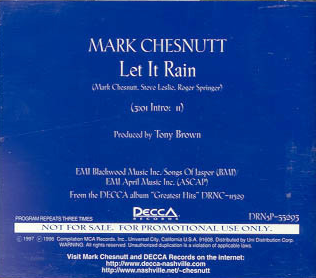
"Let It Rain" is a song co-written and recorded by American country music artist Mark Chesnutt. It was released in March 1997 as the second single from his Greatest Hits compilation album. The song reached number 8 on the U.S. Billboard Hot Country Singles & Tracks chart and peaked at number 16 on the Canadian RPM Country Tracks chart. It was written by Chesnutt, Roger Springer and Steve Leslie.
"Old Hippie" is a song written by David Bellamy, and recorded by American country music duo The Bellamy Brothers. It was released in April 1985 as the first single from their album Howard & David.

"Stand Up" is a song recorded by American country music artist Mel McDaniel. It was released in September 1985 as the lead single and title track from McDaniel's album Stand Up. It peaked at number 5 on the U.S. Billboard Hot Country Singles & Tracks chart and at number 3 on the Canadian RPM Country Tracks chart. It was written by Bruce Channel, Ricky Ray Rector, and Sonny Throckmorton.
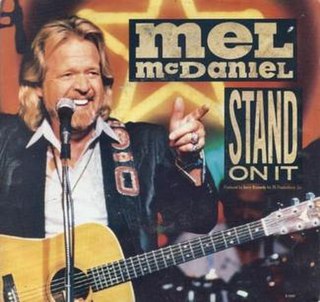
"Stand on It" is a song written and originally recorded by Bruce Springsteen. Springsteen initially released it as the non-LP B-side of the "Glory Days" single in May 1985; the track was also featured in the film Ruthless People and its accompanying soundtrack album. "Stand On It" later appeared in a slightly longer version with an extra verse on Springsteen's outtakes and B-sides compilation Tracks.
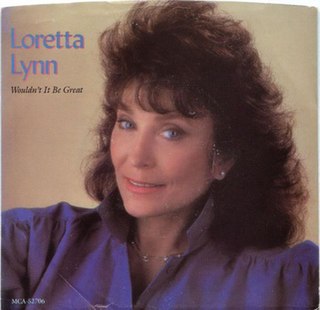
"Wouldn't It Be Great" is a song written and first recorded by American country artist Loretta Lynn. It was originally released as a single in 1985, becoming a minor hit on the national country charts following its release. It was then released on Lynn's 1985 album. In 2018, it was re-recorded and re-released as a single, becoming the title track for her 2018 studio album.
"Let a Little Love Come In" is a song written by Bob McDill, and recorded by American country music artist Charley Pride. It was released in May 1985 as the second single from his Greatest Hits, Volume 2 compilation album. The song became a top 40 hit on the Billboard country chart.
References
- ↑ Whitburn, Joel (2008). Hot Country Songs 1944 to 2008. Record Research, Inc. ISBN 978-0-89820-177-2.
- ↑ https://www.youtube.com/watch?v=nJqHs6LVWEs